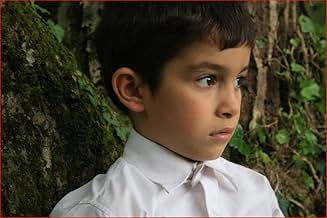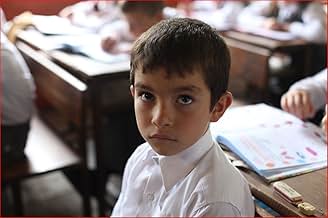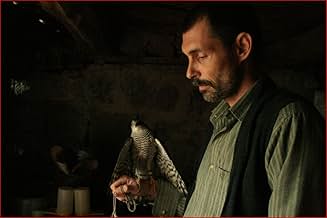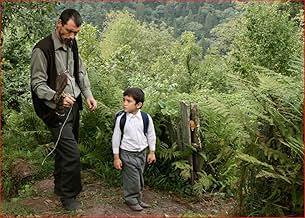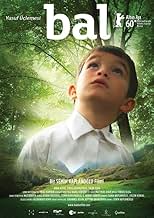IMDb RATING
7.1/10
7.7K
YOUR RATING
The quiet life of a boy and his family is endangered when his father does not return home from his work collecting honey in the forest.The quiet life of a boy and his family is endangered when his father does not return home from his work collecting honey in the forest.The quiet life of a boy and his family is endangered when his father does not return home from his work collecting honey in the forest.
- Director
- Writers
- Stars
- Awards
- 14 wins & 15 nominations total
- Director
- Writers
- All cast & crew
- Production, box office & more at IMDbPro
Featured reviews
From time to time you encounter a movie that's excellent, but somehow doesn't get to you the way it should. This one's such a movie.
So much is done the right way: the calm narrative style and some wonderfully photographed scenes deepen the already atmospheric location work; the actors are convincing; and there's no need for cheap plot twists and conclusions.
But something's missing, maybe some sort of magic realism that would transcend the simple story into a meatier concoction.
I liked it, but I didn't love it.
7 out of 10 humiliating book-readings
So much is done the right way: the calm narrative style and some wonderfully photographed scenes deepen the already atmospheric location work; the actors are convincing; and there's no need for cheap plot twists and conclusions.
But something's missing, maybe some sort of magic realism that would transcend the simple story into a meatier concoction.
I liked it, but I didn't love it.
7 out of 10 humiliating book-readings
it is tempting to define it as art film. or as poem about life. or as masterpiece. in fact, it is only a story. a story like many others from the old times. a family. a boy. memories. and the absence. all is well known. the film is only support for remind. and each scene becomes a trip in yourself. a circle around basic truths. rediscover of the purpose of cinema. this is all. a family. a boy. the father. and the forest. like a line. letters and signs and the voice of teller. parts of reflection of world in yourself.
I had wanted to see Bal for a long tie. Finally, I watched it yesterday. Bal is an interesting movie. When a movie has very little action but keeps your attention for two hours, you develop a feeling of respect for the team who made it. You are convinced that making such a movie has lots of difficulty involved, and this mere fact evokes feelings of respect for it within you. Nevertheless, respect does not automatically bring the status of being good to it. Especially, if the movie attempts to give almost all its messages through symbols, looks and constantly rotating camera scenes, another difficulty is brought up, which, in turn, gives rise to evoking feelings of respect for it within you again. This time, the source is the fact that you feel ignorant to decode those messages. In addition, watching Bal is like viewing a Discovery Channel documentary in that the movies presents lots of scenes of both natural and man-made surroundings. However, there is a clear difference between the Discovery Channel documentary and Bal as the events made up of messages in the movie are not coherent and form a congruent story. At the end of the movie, I wanted very much to have conversations with the Jury in Berlin to have a glimpse of what they had thought in honeying Bal with a prestigious award.
The slow pace of Bal works to great affect as it explores the tribulations of a young boy not only with the conventional use of a storyline narrative but also with a range of beautiful compositions which equals the sophisticated style of vivid portraits.
Yusuf is a young boy who is an outsider yet vastly intelligent. He is at odds with his school life never fitting in amongst his peers, constantly watching them from a distance along with struggling in parts of his studies. When Yusuf stutters through a reading in class minimal techniques are used, only the camera slowly tracking towards Yusuf and multiple POV shots of school peers focusing on Yusuf in awkward silence contain the scenes vibe yet it strikes such an impact emotionally feeling Yusuf's embarrassment. Whereas watching Yusuf with his Father in a simple static shot as they work and explore in the local woodlands shows his deep connection with nature by knowing the names and mannerisms of various plants, it is wonderful to witness the bond the pair have and to feel Yusuf's tranquillity. The techniques used to capture these moments are simple yet effective showing the brilliance of Bal.
Bal contains strong visual elements not only in the minimal techniques used to capture Yusuf's story but in the compositions which are styled with outstanding detail. Yusuf sat alone in a barn facing the camera in mostly dark lighting to inhabit his depressing mood before the head of his Father's donkey appears from behind Yusuf to provide comic relief convey his mood in the same manner a later dream sequence. After his Father goes missing Yusuf begins to have haunting dreams, one of which is himself stood alone in the forest with the visuals being one of a greyish palette before dead bees drop into his hand as a foreboding of his Father's death.
In a way it is hard to describe Bal as a film because its much more. Bal is a piece of visual art that transcends from its quiet storyline to present the atmosphere and emotions embedded in Yusuf's life as well as those around him with striking use of compositions and ingenuity. Bal is not a viewing experience for everyone, only those who appreciate the visual sophistication celluloid can offer will be moved by this film.
Yusuf is a young boy who is an outsider yet vastly intelligent. He is at odds with his school life never fitting in amongst his peers, constantly watching them from a distance along with struggling in parts of his studies. When Yusuf stutters through a reading in class minimal techniques are used, only the camera slowly tracking towards Yusuf and multiple POV shots of school peers focusing on Yusuf in awkward silence contain the scenes vibe yet it strikes such an impact emotionally feeling Yusuf's embarrassment. Whereas watching Yusuf with his Father in a simple static shot as they work and explore in the local woodlands shows his deep connection with nature by knowing the names and mannerisms of various plants, it is wonderful to witness the bond the pair have and to feel Yusuf's tranquillity. The techniques used to capture these moments are simple yet effective showing the brilliance of Bal.
Bal contains strong visual elements not only in the minimal techniques used to capture Yusuf's story but in the compositions which are styled with outstanding detail. Yusuf sat alone in a barn facing the camera in mostly dark lighting to inhabit his depressing mood before the head of his Father's donkey appears from behind Yusuf to provide comic relief convey his mood in the same manner a later dream sequence. After his Father goes missing Yusuf begins to have haunting dreams, one of which is himself stood alone in the forest with the visuals being one of a greyish palette before dead bees drop into his hand as a foreboding of his Father's death.
In a way it is hard to describe Bal as a film because its much more. Bal is a piece of visual art that transcends from its quiet storyline to present the atmosphere and emotions embedded in Yusuf's life as well as those around him with striking use of compositions and ingenuity. Bal is not a viewing experience for everyone, only those who appreciate the visual sophistication celluloid can offer will be moved by this film.
Bal is the Turkish word for honey, and that is part of the storyline. Yusuf, a six year old boy, wanders about, searching for both his father and the meaning of life, in no particular order.
His father suffers the trials of Job, his bees have vanished for no apparent reason and he has a family to feed. An accident leads to dads early demise, so most of the film is told from the perspective of Yusuf, who as played by Bora Atlas, is an absolute casting miracle. The kid is tremendous; he owns the screen.
There is very little dialogue, so the actors must use their faces to portray real human emotions. The scenery is beautiful and the sounds of nature fill the air. In the mood for a quiet, thoughtful movie with actual heart and soul, then Bal should be just right.
His father suffers the trials of Job, his bees have vanished for no apparent reason and he has a family to feed. An accident leads to dads early demise, so most of the film is told from the perspective of Yusuf, who as played by Bora Atlas, is an absolute casting miracle. The kid is tremendous; he owns the screen.
There is very little dialogue, so the actors must use their faces to portray real human emotions. The scenery is beautiful and the sounds of nature fill the air. In the mood for a quiet, thoughtful movie with actual heart and soul, then Bal should be just right.
Did you know
- TriviaThe poem that a female student reads aloud and which Yusuf listens to is a Turkish translation of Arthur Rimbaud's "Sensation."
- ConnectionsFollows Egg (2007)
- How long is Honey?Powered by Alexa
Details
Box office
- Budget
- €1,250,000 (estimated)
- Gross worldwide
- $1,381,730
- Runtime
- 1h 43m(103 min)
- Color
- Sound mix
- Aspect ratio
- 1.85 : 1
Contribute to this page
Suggest an edit or add missing content

![Watch Trailer [OVS]](https://m.media-amazon.com/images/M/MV5BMjkyOGM4YzMtYWY3ZS00NTkzLWJmOWYtNzQ2MzEzYzg2MDc2XkEyXkFqcGdeQXRyYW5zY29kZS13b3JrZmxvdw@@._V1_QL75_UX500_CR0)
